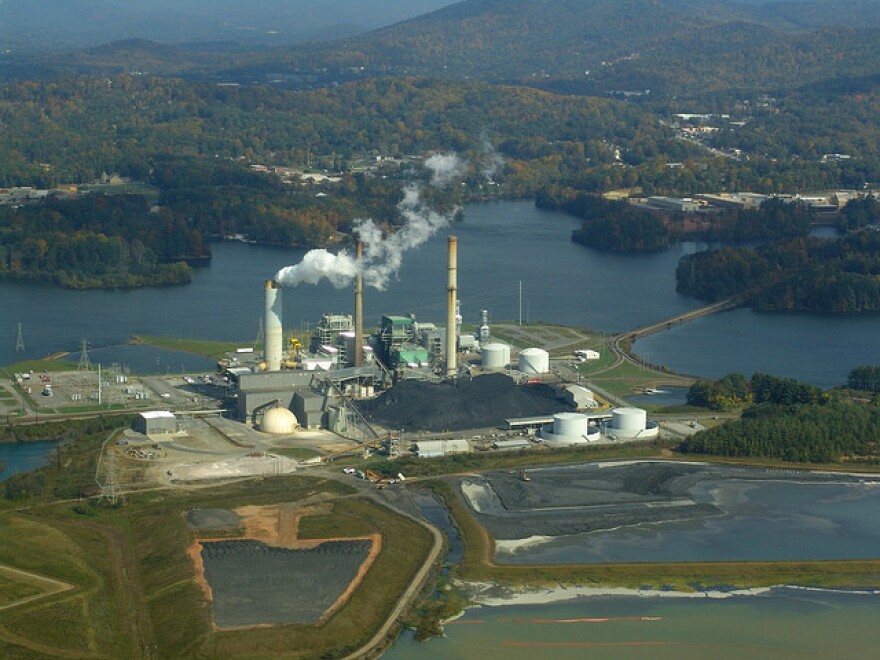Updated at 4:50 p.m.
Duke Energy Corp. has been ordered to excavate coal ash from all of its North Carolina power plant sites, slashing the risk of toxic chemicals leaking into water supplies but potentially adding billions of dollars to the costs consumers pay.
The company must remove the residue left after decades of burning coal to produce electricity, the North Carolina Department of Environmental Quality said. Duke Energy had proposed covering some storage pits with a waterproof cap, saying that would prevent rain from carrying chemicals through the unlined bottoms and would provide a quicker and cheaper option.
Duke Energy said the expanded excavation requirement could double its costs to about $10 billion. It had previously estimated the task would take up to 30 years to complete at all 14 current and former coal-burning plants in the state.
Coal ash contains toxic metals like mercury, lead and arsenic.
Monday's decision affects six coal-burning plants still operating in North Carolina. Pits at eight other power plants around the state had previously been ordered excavated, with the ash to be stored away from waterways. The NCDEQ says the company must relocate the ash to lined landfills. This follows scientific study of pollution from the ponds and public listening sessions with impacted communities.
"We did a thorough analysis of the six sites and it wasn't a decision that was made by other reasons than the science," state NCDEQ Secretary Michael Regan said in an interview. "We're making these decisions so that they are most protective of public health and the environment."
The move means North Carolina joins Virginia and South Carolina in ordering its major electric utilities to move their coal ash out of unlined storage.
Turning point for residents
Frank Holleman of the Southern Environmental Law Center called the order a "historic announcement."
He said he hopes Duke Energy will "recognize the best interests of the communities they're supposed to serve and the need to protect the state's clean water supplies, and accept the decision of the state department.” Holleman also hoped the state could finally move on from the coal ash scandal and "get about cleaning up the problem.”
Governor Roy Cooper offered his response to the development.
"We’ve seen the damage this pollution can do including the families who had to live for years on bottled water until we were able to get them connected to permanent water solutions. Now the cleanup of remaining coal ash needs to move ahead efficiently and effectively."
Regan said the decision resolves the long-running uncertainty facing those state residents impacted by the coal ash ponds.
“We are prepared to respond to any pushback or any criticism and we will let the process and the science speak for itself,” he said. “The law is very clear that we are to follow the science, follow a process in determining the fate of these coal ash ponds, and the science clearly led us to the decision that we made today.”
Monitoring data that U.S. electric utilities were required to report for the first time last year showed that of the 265 power plants reporting, nine out of 10 had contaminated groundwater with toxic substances at levels outstripping federal safety standards, Earthjustice and the Environmental Integrity Project found. The advocacy groups ranked Duke Energy's Allen power plant in Belmont the second-most contaminated in the county.
Amy Brown, who lives a few hundred yards from the plant's coal pit, said Monday the excavation order means the state is taking the steps to protect her family she and other neighbors have demanded for years.
"I can't even describe to you the joy that I feel, the peace that I now have," she said. "Whatever role we played in this, It was worth the sacrifice. It was worth it to know that these unlined, leaking coal ash pits that Duke had no intentions of ever tending to and cleaning up, they will now be cleaned up. That's huge."
A 2008 spill in Tennessee drew national attention to coal ash storage. Cleanup became a priority in North Carolina after a 2014 leak at Duke Energy site in Eden, N.C. left coal ash coating 70 miles (110 kilometers) of the Dan River on the state's border with Virginia.
Pollution penalties
Duke Energy pleaded guilty in 2015 to federal environmental crimes after an investigation found the company allowed coal ash dumps at five power plants to leak toxic waste into water supplies. The company agreed to pay $102 million in fines and restitution.
Last year, Duke Energy agreed to pay a $156,000 penalty for similar state environmental violations at three other power plants after pollution entered groundwater and the adjoining Catawba and Broad rivers.
The company said it is reviewing the agency's decision that it must fully excavate its North Carolina sites "and will continue to support solutions that protect our customers and the environment."
State utilities regulators last year set a precedent in deciding that Duke Energy's two North Carolina divisions could charge ratepayers the first $778 million chunk of cleanup costs.
The same North Carolina Utilities Commission assessed the company a $70 million mismanagement penalty, finding that Duke Energy's "irresponsible management" of its ash pits "resulted in cost increases greater than those necessary to adequately maintain and operate its facilities."
State Attorney General Josh Stein said last year he will try to stop Duke Energy from passing along its cleanup costs to 3.4 million North Carolina power customers, arguing that corporate mismanagement increased costs that shareholders should also be forced to bear.
Charlotte-based Duke Energy has 7.6 million electricity customers in the Carolinas, Florida, Kentucky, Indiana and Ohio. The company must submit its excavation and closure plans for the coal ash ponds to the state by August 1st.











